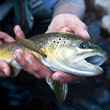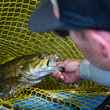In May of this year, the U.S. Supreme Court dealt a significant blow to the Waters of the U.S. (WOTUS) rule, which has been battered back and forth between presidential administrations for almost the last two decades. In its ruling, the court essentially told the U.S. Environmental Protection Agency that the ephemeral streams and wetlands that lack a permanent connection to continuously flowing streams and permanent lakes or ponds are no longer subject to federal regulation under the rule. This week, the EPA complied with the dictates of the court, modifying WOTUS — which is often referred to as the “Clean Water Rule” — ending protections for millions of miles of ephemeral streams and wetlands.
It’s a simple, yet incredibly important change that, thanks to the court, now puts the onus on state regulatory agencies — who have a historically abysmal record of protecting clean water within their borders — to monitor and ensure the health of these vital water bodies. These brooks, creeks, streams, springs, seeps, wetlands and other waters will continue to flow into our nation’s great rivers, but without any protection under the once radically transformative Clean Water Act.
WOTUS has been a political football for the better part of 20 years, beginning in 2005 with another Supreme Court ruling. That ruling instructed the George W. Bush administration’s EPA to clear up what actually qualified as “waters of the United States.” Those which qualified would be afforded protection under the Clean Water Act. Those that failed to, would not. Predictably, the conservative administration ruled that ephemeral creeks and wetlands which may only flow during part of the year — yet still contribute significantly to the health of the nation’s lakes, rivers, and streams — were not entitled to protection.
Ever since, the definition of WOTUS has been in flux. The Obama administration took up the rule, reestablishing protections for vital headwaters, arteries, and wetlands, recognizing their significant “nexus” with the larger streams, lakes and ponds into which they flow. Then, surprising absolutely no one, the Trump administration unwound the Obama administration’s change, leaving the part-time water-system once again unprotected. Continuing the seemingly endless back-and-forth, shortly after taking office in 2021, President Biden instructed his EPA to reverse the Trump rule, reinstating protections for ephemeral water bodies.
Anglers, perhaps better than most, know that we all live downstream. America's large rivers, lakes and reservoirs may capture more attention, but they are all the product of the waters that feed them. Put simply, what goes up must come down, and so any impacts to headwater streams, wetlands and other bodies in a watershed — ephemeral or otherwise — will naturally aggregate and coalesce downstream.
In truth, millions of miles streams and vast acreages of wetlands in the United States are ephemeral, part-time contributors to larger bodies of water (about 63 percent of wetlands or between 1.2 million and 4.9 million miles of ephemeral streams). Speaking with Hatch Magazine in 2017, Backcountry Hunters & Anglers John Gale noted that “Ninety percent of all stream miles in some states are intermittent or ephemeral. These headwaters, intermittent and ephemeral waters feed public drinking water supplies and support native trout fisheries. Moreover, 20 million acres of prairie potholes, America’s ‘duck factory,’ and other wetlands in the lower 48 states critical to migratory waterfowl production are considered isolated.”
The EPA, by complying with the court, has left the quality of millions of miles of wetlands and ephemeral streams to the whims of state environmental regulation departments, which are notoriously underfunded, undermanned, and often unmotivated. This, no doubt, is music to the ears of corporate agriculture, the fossil fuel industry, large real estate developers, and the lobbyists that represent their interests — all of which benefit greatly from and relentlessly advocate for reduced clean water protections.
Leave it to Biden’s EPA, however, to try and put lipstick on a pig.
“When Congress passed the Clean Water Act 50 years ago, it recognized that protecting our waters is essential to ensuring healthy communities and a thriving economy,” said EPA Administrator Michael S. Regan in a press release delivered after the EPA changed WOTUS to match the wishes of the Supreme Court. “Following extensive stakeholder engagement, and building on what we’ve learned from previous rules, EPA is working to deliver a durable definition of WOTUS that safeguards our nation’s waters, strengthens economic opportunity, and protects people’s health while providing greater certainty for farmers, ranchers, and landowners [emphasis added].”
The implications aren’t subtle, though some might appreciate Regan’s willingness to say the quiet part out loud. WOTUS is now significantly defanged, due in large part to efforts designed to placate monied interests which have little or no motivation to safeguard the health of the nation’s great rivers and lakes.
While the Clean Water Rule remains neutered, the Clean Water Act ceases to be what it once was: a celebrated, progressive idea, grounded in science, that, over the last 50 years, can be credited with making our nation’s great rivers and lakes — once widely polluted by raw sewage, industrial chemicals, and toxic heavy metals — swimmable, fishable and drinkable again.






























Comments
Pat replied on Permalink
It would seem that your blame of "Biden's EPA" is grossly misguided, and should instead be directed at the most radically polarized SCOTUS that we have had in the past century. Alternatively, you might place the blame on congress for knowingly confirming obviously political SCOTUS candidates... No, it is far too easy to lean back and sling "Biden's EPA" around...
Are you suggesting that the "Biden EPA" should have failed to comply with a SCOTUS ruling? This would open the EPA to a landslide of new lawsuits from some of the most powerful corporations on the planet....
On the other hand, if Regan failed to comply, Fox News would have gotten to use the term "Biden's ROGUE EPA", which admittedly has a nice edge to it...
Richard Harrington replied on Permalink
What Pat said.
Fritz replied on Permalink
What is the significance of so prominently displaying "right-wing Supreme Court? You've obviously have shown your hand and obvious bent. I now have unsubscribed to this publication.
Chad Shmukler replied on Permalink
Geoff Roznak replied on Permalink
That "...right-wing Supreme Court" is ruling on law.
If the law needs to be changed (which I believe it does), that responsibility lies with congress. Congress is elected by the people.
Playing the blame game only increases division and anger, and does nothing to unite anglers and other outdoors oriented people who fall all over the political spectrum.
Dragging politics into conservation, habitat, and real environmental issues has always been, and always will be a grave error. It encourages blame, division, and anger rather than working together to get what needs to be accomplished done.
Chad Shmukler replied on Permalink
I think it's worth asking why so many people reflexively think that acknowledging the Court's current, right-wing makeup is a political statement. That acknowledgement is neither counter-factual nor controversial. The current SCOTUS is right-wing.
None of the conservative justices would deny that both their interpretation of the law and their personal political beliefs fall on the right side of the spectrum. Nor would anyone familiar with the justices currently serving on the court.
This begs the question: why is acknowledging this in the headline or copy of an article interpreted as a political act? Alito, Thomas, Kavanaugh, Roberts, Gorsuch and Coney Barrett all have well-documented Federalist Society ties. Understanding the current makeup of the court — which, as a result of being decidedly right-of-center — makes the majority of its justices predisposed to interpret the law from an anti-regulatory point of view that favors corporations and large businesses.
To analyze the Court's actions and its impacts elsewhere in governmental policy without acknowledging these realities would seem like a deliberate effort to not understand the forces at work in any meaningful way.
Geoff Roznak replied on Permalink
"Right Wing" implies - to many people - far right.
I'm sure that's not what you mean, but it's reality.
Law should always be evaluated conservatively, because there is clarity in that evaluation as opposed to a loose evaluation that allows to much interpretation at other levels.
I am a staunch supporter of, and participant in, habitat, conservation and genuine environmental issues.
We do not need the clutter of left/right, liberal/conservative, and the divisive anger inducing static and noise that goes along with it.
We certainly have to work with politicians to achieve our goals, but we should keep everyone's politics out of the process.
Doing what's right is not a political decision, or process.
Chad Shmukler replied on Permalink
With all due respect, Geoff, that's not what "right-wing" means, despite how some might interpret it. "Right-wing," like "left-wing," refers simply to the right (or left) side of the political spectrum. Anyone right of center is part of the right wing, anyone left of center is part of the left wing.
While I appreciate your thoughts and your position, I respectfully disagree. It serves none of us to pretend that left/right divisions do not exist.
Not only do they exist, they are a fundamental part of any body politic. No matter whether you're talking about the U.S. or another country, every nation state has its political divisions, its conservative participants and its more liberal participants. It also has libertarian, socialist, and participants of countless other stripes that drive its internal politics.
Understanding and acknowledging these competing interests is key to a civilized, functioning government and political system. We must take back ownership of reasonable, accurate, meaningful political labels — which allow us to better understand our nation's politics and governance — and reject the idea that they are harmful invective or insults to be avoided.
Geoff Roznak replied on Permalink
With all due respect, Chuck, that you and I may understand what "Right Wing" and "Left Wing" really mean, much - if not most - of the general public perceive it otherwise. Clever writers like to use this as a way to push their agendas, keep people angry and divided; to pretend otherwise serves no purpose.
I don't recall writing that I thought that we should pretend left/right divisions do not exist. While I tend to agree with much of the rest of what you wrote, it's a tangent I'm unwilling to travel on this forum. It's simply not the place for it.
What I wrote was that bringing politics to the discussion has no place in habitat/conservation/real environmental efforts.
I have considerable experience with the results of such misguided attempts to make politics part of those discussions; not once have the attempts ended well, or benefited the habitat/conservation/real environmental efforts.
Donors and supporters have been lost, previously solid and functional relationships have been ruined, and in same cases, bullheaded political stubbornness has derailed groups, events, and activities. Those were direct, bottom line issues, all because someone decided their politics were more important than our goals as an organization.
Given the experience I have lived and learned from, I cannot currently think of a single reason why I would accept political agendas in our efforts to to do what we need to do with regard to habitat and conservation.
You certainly have the right to disagree with that, but I will never stop fighting to keep politics out of the work we do. Or commenting n it when I see it.
Chad Shmukler replied on Permalink
And yet politics are at the heart of every conversation involving regulation.
Politics are what elect the legislators that craft and vote our regulatory laws and frameworks into place. And, like it or not, political organizations and entities — like the Federalist Society, ALEC, and Heritage Foundation, just to name a few — play outsized roles not only in influencing what judges get appointed to federal and other benches around the nation, but in how law is interpreted.
I don't disagree with you that American politics have become so toxic that they often derail efforts by well-meaning people to cooperate and achieve conservation and other goals. Where I disagree is on the suggested premise that politics, by nature, is a toxic enterprise.
It is only because we have allowed political labels and the notion of political engagement to be reduced to a tribal, identity circus, devoid of substance and reduced to little more than labels with which to assault our perceived "enemies" that it has become so.
The solution to this is not to pretend we can bridge gaps in socioeconomic status, culture, geography, race, or other divisions without acknowledging our political differences, it is to reclaim them and celebrate them, and to rebuke the notion that politics is anathema to cooperative engagement (when the reality is it is essential to it).
Geoff Roznak replied on Permalink
Again, I don't disagree with much of what you wrote there...but it's tangential to what I was getting at.
1) Blame and finger pointing - which is what the editorial we're discussing does - is not useful, or productive.
2) Politics does not belong in habitat, conservation, or real environmental efforts.
Nothing you've written so far changes my perspective on those two things.
Anonymous replied on Permalink
Its not though, its 3,3,1. John Roberts when it has mattered to conservatives has stayed moderate. He not a right wing justice.
Chad Shmukler replied on Permalink
You'll get no argument from me that Roberts has shown he falls closer to the center of the spectrum than his conservative counterparts on the court. That said, the implication that Roberts is not still soundly right-of-center simply doesn't hold water.
Pages